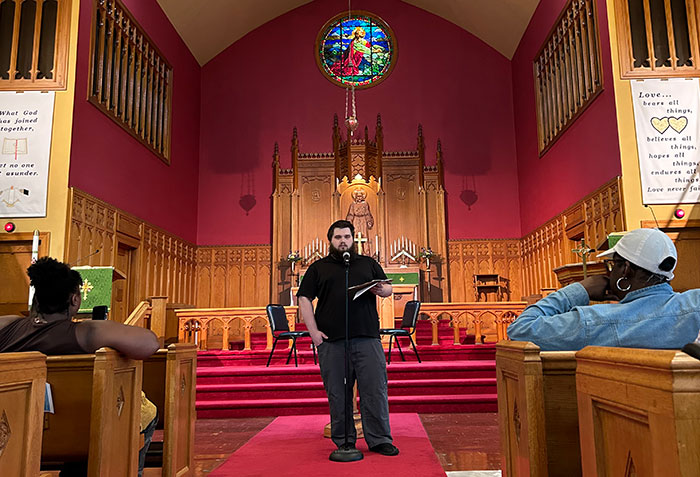
Gavin Gassmann shares his story of living in substandard housing as a renter in Davenport during a Housing Justice Community Forum June 3 at Zion Lutheran Church in Davenport.
By Barb Arland-Fye
The Catholic Messenger
DAVENPORT — The displacement of tenants from a 400-unit, substandard apartment complex in Iowa City led the city to take “a deep dive” into how to prevent that situation from happening again. That effort led to a rent abatement ordinance enacted in 2017, Iowa City Senior Housing Inspector Stan Laverman said during the Housing Justice Community Forum on June 3 at Zion Lutheran Church in Davenport.
Quad Cities Tenant Alliance (QCTA), an outreach of Quad Cities Interfaith (QCI), organized the forum to gain community support for a Davenport rent abatement ordinance modeled after the Iowa City ordinance.
Efforts to pursue a rent abatement ordinance in Davenport to protect tenants from displacement intensified after the partial collapse of the Davenport apartment building on May 28, 2023 that caused three deaths, injuries and displacement of tenants. This past March, another downtown Davenport apartment building failed inspections and its tenants had to evacuate.
The proposed ordinance would allow Davenport’s inspections department to relieve tenants, temporarily, of the duty to pay rent when a threat to life and safety exists. Tenants could use their rent money to pay for relocation expenses if an emergency evacuation happens. The ordinance would also provide a safety net for tenants who report substandard housing, according to a QCI fact sheet.
Supporters believe a rent abatement ordinance would incentivize property owners’ compliance with the building code and ensure proactive investment in safe and decent housing. QCI reports a rental housing shortage of 6,645 units in the Quad Cities area. The National Low Income Housing Coalition (NLIHC) reports that Iowa, overall, has a shortage of 58,377 rental homes that are affordable and available to the state’s extremely low-income residents.
Lessons learned
In a conversation-style interview with QCI board member Beth Longlett during the forum, Laverman emphasized that Iowa City’s solution to addressing substandard housing did not happen overnight. Prior to Iowa City’s adoption of a rent abatement ordinance, “There were a lot of years when tenants lived in buildings that were substandard,” he said. Among them were tenants of the former Rose Oaks Apartments.
In 2016, a new property owner informed Rose Oaks tenants of the decision to demolish some of the apartment complex’s buildings and renovate others for student housing, which resulted in the tenants’ displacement. Due to “the city’s striking lack of affordable housing,” the Iowa City Council allowed tenants who qualified (207 households) to apply for $250 per household in public money, according to The Gazette (8-16-2016).
“We have a lot of development in Iowa City and lot of development pressure,” Laverman said. So, “to protect tenants when large complexes like this are redeveloped in the future, we have assistance for the tenants that are displaced, moving assistance, deposit assistance, and then we also implemented the rent abatement ordinance.”
In the past, “there were multiple occasions where we should have taken additional steps, but we weren’t aware of the tool of rent abatement. In 2008, it was so bad that we removed Section 8, or housing choice vouchers, for the property because we didn’t have the confidence that those units would stay in compliance,” Laverman continued. The city became aware of the option for rent abatement in late 2016, he later told The Catholic Messenger.
“While it seems like in 2017 we had this grand vision and protected tenants immediately, that’s a story that’s been cleaned up a little bit,” he said at the forum. “We were in the weeds for a long time.”
So, why was he in Davenport? “I think it’s important for us to admit the mistakes that we made. We’re not perfect in Iowa City and we need to pay it forward and make sure other people are aware of this opportunity.”

Quad Cities Interfaith board member Beth Longlett interviews Iowa City Senior Housing Inspector Stan Laverman during a Housing Justice Community Forum on June 3 at Zion Lutheran Church in Davenport.
A tool to use rarely
In response to a question from Longlett, Laverman described the typical rental inspection process in Iowa City, which maintains a one- to two-year systematic rental inspection cycle. The city has nearly 20,000 units in 4,500 licensed properties. He oversees a staff of eight — five housing inspectors, two nuisance code inspectors and one inspector scheduler — and would not be able to maintain the rental cycle inspection with less staff, he said in an email response to questions from the Messenger.
In the seven years since the rental abatement ordinance became law, “we’ve used it 14 times, which isn’t a lot,” Laverman told the forum participants. His staff takes a methodical approach to ensure that property owners correct deficiencies before reporting noncompliance. The next step is for Laverman to inform the city’s building official, who issues notice of rent abatement.
Property owners have one final opportunity — a 10-day notice — to correct the deficiency or deficiencies. “Honestly, once they get that notice that they’re not getting rent next month, it’s amazing all the roadblocks that go away, for the most part,” Laverman said. “Not all of them are wins. A lot of times it’s corrected immediately.”
He cautioned, “Rent abatement is a big stick. The state grants us the authority to use it. I think it’s important to use it appropriately and rarely.”
Inhumane experiences
Gavin Gassmann, who endured substandard housing as a renter in a Davenport apartment building, described how that experience and the widely publicized displacement of renters from three different complexes over the last four years led him to join QCTA. Following months of water damage in his own apartment, the ceiling caved in on his bed. Fortunately, he said, he was not home at the time.
Gassmann contacted city officials, who worked with the landlord to correct problems. The fix was temporary, however. Gassmann chose to move out when deficiencies recurred because he didn’t have confidence the city would convince the property owner to comply. Later, he learned the city condemned his former apartment building. A rent abatement ordinance might have prevented that from happening through correction of deficiencies before it is too late, Gassmann believes.
“We know that building inspectors often face a Catch 22 when attempting to enforce the Code. When substandard buildings are condemned, Davenport renters are displaced. When the buildings are not condemned, there can be catastrophic consequences (such as the partial collapse of the Davenport).”
Another QCTA member, Ruth Quick, read a statement from Ashley Hendley, who described a nightmarish experience that she and her partner dealt with as tenants in a Davenport duplex. “Our home was infested with mice and our furniture was infested with bedbugs,” she said. “We had to leave everything behind to avoid bringing bugs with us. The mold was so severe. I got pneumonia for several months. But the worst problem was the sewage coming out of our faucets. Can you imagine dealing with itchy bed bugs and having to shower with sewage water? It was inhumane.”
Hendley said she supports a rent abatement ordinance “because no human being should have to clean their dishes with raw sewage in their water. Our landlord’s negligence impacted every area of our lives, our physical wellbeing, our mental health and our financial stability. When the city condemned our building, we had to leave on very short notice. We had to come up with funds for a hotel, first and last months’ rent, and a security deposit. The financial blow was devastating.”
Next steps
Laverman told forum participants that he attends meetings of property owners to understand better their needs and challenges. He said most property owners are responsible and are committed to keeping their properties in good working order for tenants. A rent abatement ordinance compensates tenants suffering at the hands of landlords who are not in compliance of the housing code. “This is one final tool to make sure that landlords are following the housing code.”
A follow-up email from QCI informed its supporters that momentum for a rent abatement ordinance is growing and that four Davenport alderpersons have committed to voting “yes” if the ordinance passes a review from legal advisers. QCI encouraged supporters to contact the Davenport City Council to support the proposed rent abatement ordinance.








